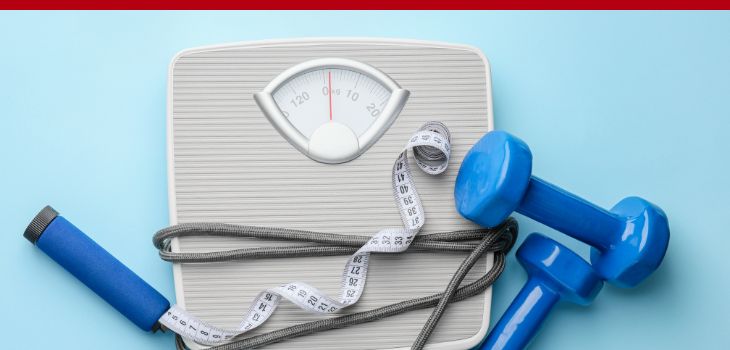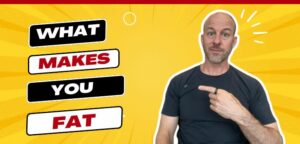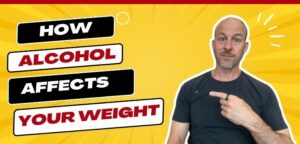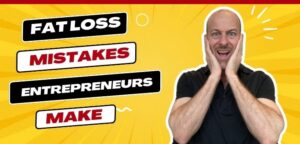Have you noticed that the fitness industry has relied exclusively on dieting and exercise to help people lose fat and get fit?
Yet, although eating healthy and staying active is a must in the fat loss journey, research and thousands of cases showed that those two things alone won’t make any difference; you must also incorporate healthy habits into your busy routine.
We’ve learned that winning the battle against body fat is not too much about tactics but about habits.
So, what habits can help you lose those extra pounds, and why are they so important?
In this Ted Talk episode, Ted shares 3 simple (but effective) habits that will help you lose fat, keep those extra pounds off for life.
He explains how to maintain habits over time, why they are crucial in losing weight, and how to turn them into unskippable parts of our daily routine.
Plus, he shares bonus tips on healthy eating, overall health, and much more.
You’ll learn:
- Why developing daily habits is crucial to sustainable weight loss
- How to control and reduce hunger
- 3 Ways to build and maintain muscle as you age
- Why is sleep important? Top reasons for getting a good night’s rest
- Doing THIS Helps Keep Your Appetite Under Control
- What is the best way to burn calories during the day
- And much more…
Related Episodes:
TEd Talk 146: 14 Weight Loss Lessons I Learned in 23+ Years of Coaching
505: 5 Harsh Truths About Fat Loss (That No One Is Telling You)
Links Mentioned:
Watch our Body Breakthrough Masterclass
Schedule a 15 mins strategy call
Learn more about our success stories
Do You Need Help Creating A Lean Energetic Body And Still Enjoy Life?
We help successful entrepreneurs, executives, and other high-performers burn fat, transform their bodies, and grow successful businesses while enjoying their social life, vacations, and lifestyle.
If you’re ready to have the body you deserve, look and feel younger, and say goodbye to time-consuming workouts and crazy diets, we can help you.
Go to legendarylifeprogram.com/free to watch my FREE Body Breakthrough Masterclass.
Podcast Transcription: 3 Simple (But Effective) Habits That Will Help You Lose Fat Without Diets Or Hard Workouts
Ted Ryce: Today I want to share with you three simple but effective habits that will help you lose fat without diets or hard workouts. What is up, my friend? Welcome back to the Legendary Life podcast. I'm your host, Ted Ryce, health expert, and coach to entrepreneurs, executives, and other high-performing professionals.
And what I want to tell you is this: I've been helping clients lose fat for over 23 years. And I've been in this journey myself personally. And one of the things that I've learned more recently, maybe, let's say within the past five years, is that it's really about habits, not diets or hard workouts.
And it was a big shift in my thinking to start to approach my clients this way, or start to approach fat loss this way. And not only has this helped me with that loss, but it's also helped me with other things as well. It's helped me grow my business. And one of the things I would even tell you is like, start to focus on habits instead of tactics. And this is a little bonus here.
But what happens to people is this: they try to do these hard workouts or strict diets, and they can't turn it into a habit. Does that make sense? A habit is something you do all the time. For example, you brush your teeth, you floss, hopefully, you floss.
But another bonus tip, your oral health is connected to your body health. And if you have problems with your oral health, you're more likely to get heart disease and diabetes and other things. So, brush and floss. But let's say you're doing it. It's a habit for you. In fact, one of my clients recently—shout out to you, Chris.
He said, “Oh, yeah, I can't go to bed without flossing my teeth.” But before, he didn't floss at all. Can you relate to that? I do the same thing. It's hard to skip flossing now. I feel like I'm really screwing up my life if I skip flossing, so focus on habits. And the habits that you focus on need to be things that you can turn into a lifestyle. In other words, you need to be able to do the habit for the rest of your life. That's what a lifestyle is.
And so today, I want to share with you these three simple pieces of advice that I give anyone struggling with fat loss. And especially if you're struggling, like you're pushing yourself working so hard in the gym, and you're trying to make big changes to your diet. Listen, it doesn't have to be that hard. In fact, these are three simple habits that I follow and teach my clients that helped them lose up to 30 pounds in four months. And not only that, they feel like they can keep it off. So, let's get into it.
Habit number one, eat 50 grams of protein in every meal. Why? And you might even say, “Well, I read that your body doesn't even absorb more than 30 grams. Why would I try to eat 50? Why is this important? Isn't fat loss about eating less, not more, and you're telling me to eat more?” All great questions.
And here's what I want you to know. Fat Loss is really about hunger control. It's really about managing your hunger. It is not about the carbs and the fat and the other things; it is about some foods make you feel full other foods don't. If you eat too many of the foods that don't make you feel full, you're going to eat and eat and eat and eat and eat.
And a lot of people think they have an eating disorder or something, because they'll eat a couple of potato chips or a couple of cookies and then the whole bag disappears. And what I want to tell you is this, it's not you, you're having a normal response to that type of food. So how can we get round it? By shooting for 50 grams of protein in every meal? How does this help you?
Well, it helps you stay full longer than carbs or fat. If you eat 50 grams of protein from chicken breast or from egg whites from sirloin steak, you're going to have a hard time eating other things. Protein also helps you build or maintain muscle. And this is an important thing, especially if long-term fat loss and long-term health is important to you.
And the third thing is that protein actually costs more energy to digest than carbs or fat. We know that fat takes very little to digest, carbs is around 10%. But protein, it can be 15, 20, 25, even up to 30% for high-protein meals. So, if you're interested in losing fat without feeling hungry, shoot for about 50 grams of protein in every meal. And you may ask, well, how do I do that?
Well, you've got to do a little bit, you don't have to track your calories. You don't have to, like I've said many times on this podcast, download My Fitness Pal, although it would make it easier. You can do it by hand, you can just say like, okay, well, look it up. What do I need to eat to get to 50 grams of protein? And just do it.
Personally, I use My Fitness Pal—super easy. And you can go looking at Add Foods, you can go to the foods that you know, and just go and do that. Go to Add Food. You don't even need to upgrade to premium to do it, just to figure out your meals, add it up to 50 grams.
Now here's a couple of important nuances. You wouldn't want to eat, let's say to get to 50 grams… So I don't know the answer to this, I'm actually going to look it up while we while we talk. So I'm going to look up an egg. So, one large egg. So, to get to 50 grams of protein, I would have to eat eight large eggs. So that would give me 38 grams of fat, and 50 grams of protein. That's a lot of fat for 50 grams of protein.
So, what I would tell you is this, a little bonus tip: stick to lean sources of protein. What are those? Well, there's any type of seafood, we're talking octopus, clams, oysters, mussels, etc. I happen to like seafood a lot these days, but I know a lot of people don't. And I used to be that way.
So chicken breast 0% fat, Greek yogurt. Get the Chobani or the Fage; those tastes the best, in my opinion. But if you have another one that you like, that's fine too. I already said egg whites. Look for foods that are lean, that are very high in protein. So, 70% or more of the calories are coming from protein and not fat. So ,there's a little bit of a bonus tip there.
I know I'm giving you more work to do, but it pays dividends. And that's what I teach my clients to do in my coaching program. Next habit, sleep seven hours per night. Now look, sleep won't make you lose fat by itself, but it can help a lot. And if you're not sleeping at least seven hours—we could say six and a half. But really shooting for about seven hours.
I think I got six. Let me look, see what I got last night. So, I got six hours and 51 minutes. And I'll tell you, you know, I feel much better than when I sleep six hours and 20 minutes or six hours and 10 minutes. Now I'm using an Oura Ring to track that, by the way. They don’t pay me to say that, just in case you're wondering, but I use the product ever since the beginning of 2019.
And it's allowed me to dial in my sleep. And it's allowed me to focus on this habit, which is shoot for seven hours of sleep every night. And if you don't do this, you're going to be hungrier. Poor sleep, increases your hunger by raising ghrelin levels. Ghrelin is your hunger hormone.
If you've ever had your stomach crumble, right? All of us. That's ghrelin at work. And it goes beyond hunger. It also causes cravings for junk foods. So, it sensitizes the reward system of your brain. Because not only are you hungry, you don't want the kale shake, or the Superfood salad.
You want the ice cream, the pizza, the whatever it is that you're into, the deliciousness food, you need something more delicious, more rewarding to your brain, more pleasurable to eat. And the other thing is it lowers your motivation to exercise. You ever get up in the morning and like, “Oh my gosh, I'm supposed to work out and I have zero energy to go do that.”
And then you've slept, let's say seven or eight hours, and then you get up and you're like, “Oh my gosh, I got to go work out, I have plenty of energy to do that!” The big difference is the quality of sleep that you get. So, make it a habit to sleep seven hours every night. And I want to tell you this: “Oh but, Ted, every night?” Well, you know, do your best, but have it as a standard, have it as a minimum, as a target.
We're not always going to hit our targets. But if we can sleep seven hours or more nights, then less nights, we're going to be better off. Your appetite is going to be in check. You're going to have the motivation workout, you're going to get better results in the gym, because you're going to perform better, and it makes everything easier.
So again, no diet necessary. No hard workout necessary. A lot of people work out hard, but the reason it's so hard is because you're sleep deprived. You're going into the gym already feeling like you have no energy. Sleeping seven hours and I can fix that.
Habit number three, walk 10,000 steps every day. Now most people think that the reason I'm telling you to do this is because you're going to burn a lot of calories. Well, there is some truth to that you're going to burn more energy if you're doing more exercise, but it goes beyond just burning the calories.
Most people think that being active makes you hungry, but the opposite is true. Studies have shown that a sedentary lifestyle increases your appetite. So in other words, certainly, exercising a lot increases your appetite. But if you're sedentary, it increases your appetite. So, a lot of people have this idea that oh, well, I shouldn't be that hungry, because I don't do much. And if you exercise, you're hungrier.
But the reality is, if you're sedentary, the research has shown that people who have sedentary lifestyles are as hungry as people who are very physical and do a lot of physical activity. So, it's like you're the same amount of hungry as someone who is extremely active. But the issue is, they're moving around and burning energy and you're not.
So, walking more can reduce food cravings. It can also help you make better food choices, and of course, burn more calories during the day. And honestly, I wish someone had told me these three things earlier in my career. It's like, focus on eating the protein in every meal, 50 grams. If you do that, it's going to be hard to be overweight, because you're going to be full.
Why do we eat? Really simple, we're hungry. It's not carbs, or any of the complicated nonsense that people talk about. We eat because we're hungry, yes or no? Yes or no? If you're full, do you still want to eat more? Now, some people do. And I've been there myself. Now that's more of a stress issue, right?
But in general, when let's say you've had a good night's sleep, and you don't have superduper, high stress going on in your life, if you eat a satiating meal, do you still want to eat after? No. So having those 50 grams of protein in every meal, can be a game changer. Shooting for seven hours of sleep every night, can be a game changer as well.
How do you know if you're doing that? Get some type of wearable to track it, if you have sleep issues. But less than seven hours should be unacceptable. Or let's say less than six and a half hours, it should be unacceptable. It's like being sedentary, or eating junk food. A little bit as okay, but if that's your normal, that should be unacceptable for you.
You don't want to live off Cheetos. You don't want to live on your butt, sitting on your butt all the time. And you certainly don't want to live with less sleep than six and a half or seven hours per night. And when I say sleep, I just want to say one more thing, I'm talking about actual sleep. I’m talking about how long you spend in bed.
For example, the Oura Ring told me I spent eight hours in bed, but I slept six hours and 51 minutes. That's called sleep efficiency, by the way, it's your time in bed versus the total sleep time. So Oura Ring can help you with that. And then habit number three, walk 10,000 steps every day.
I use the Oura Ring to track my steps, but you can use a Fitbit. Let's say you don't have sleep problems, you sleep like baby, I'm very jealous. But walk 10,000 steps per day. So those are the three habits: eat 50 grams of protein in every meal, sleep seven hours per night, walk 10,000 steps per day.
And again, I don't want you to just listen to this and nod your head and go, okay, Ted, you sound like you know what you're talking about. I'll just, you know, keep listening. No, I want you to test this stuff. Go and put it into play in your life. Actually, apply it and see what happens.
And then I'd love to hear from you. I'd love to hear from you. Especially if you're on Twitter. Reach out to me @ted_ryce. That's T-E-D underscore R-Y-C-E and let me know how it works for you. Test it for a week and see what happens and get back to me.
All right, that is it for today. Hope you enjoy this. Go put those habits in play, go test them in your life, get some feedback. And then if you're on Twitter, come and share it with me. We'd love to hear from you. Hope you have an amazing time, and I'll speak to you soon.
Sign up to receive email updates
Enter your name and email address below and I'll send you periodic updates about the podcast.









